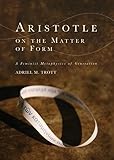Aristotle on the Matter of Form : Α Feminist Metaphysics of Generation / Adriel M. Trott.
Material type: TextSeries: Cycles : CYCLPublisher: Edinburgh : Edinburgh University Press, [2022]Copyright date: ©2019Description: 1 online resource (280 p.)Content type:
TextSeries: Cycles : CYCLPublisher: Edinburgh : Edinburgh University Press, [2022]Copyright date: ©2019Description: 1 online resource (280 p.)Content type: - 9781474455220
- 9781474455251
- 111.2 23
- B491.F63 T76 2019eb
- online - DeGruyter
| Item type | Current library | Call number | URL | Status | Notes | Barcode | |
|---|---|---|---|---|---|---|---|
 eBook
eBook
|
Biblioteca "Angelicum" Pont. Univ. S.Tommaso d'Aquino Nuvola online | online - DeGruyter (Browse shelf(Opens below)) | Online access | Not for loan (Accesso limitato) | Accesso per gli utenti autorizzati / Access for authorized users | (dgr)9781474455251 |
Frontmatter -- Contents -- Acknowledgements -- Introduction: Aristotle and the History of Sex -- 1. Feminist Critics of Aristotle’s Biology and Metaphysics -- 2. Disputes over the Material Contribution of Semen -- 3. Aristotle on Material -- 4. The Feminine and the Elemental in Greek Myth, Medicine and Early Philosophy -- 5. Semen, Menses, Blood: Material in Generation -- 6. Sex Diff erentiation, Inheritance and the Meaning of Form in Generation -- 7. Craft and Other Metaphors -- Conclusion: On Material in Aristotle’s Biology -- Bibliography -- Index Locorum -- General Index
restricted access online access with authorization star
http://purl.org/coar/access_right/c_16ec
Argues for an interdependent relationship of form and matter in Aristotle's metaphysicsListen to the interview of Sarah Tyson at the New Books Network with the author Adriel M. TrottOffers a clear and innovative account of Aristotle's biological works, informed by Continental philosophy and inflected by feminist interests and concernsContextualises Aristotle's views of gender in ancient Greek mythology, medicine and early philosophySituates its argument in the debates between Luce Irigaray and Judith Butler on the meaning and role of matter in the history of philosophyChallenges the gender binary by challenging the metaphysical binary of form and matter: an association that can be traced to AristotleShowcases how Aristotle's account is fundamentally phenomenologicalAdriel M. Trott challenges the wholesale acceptance of the view that nature operates in Aristotle's work on a craft model, which implies that matter has no power of its own. Instead, she argues for a robust sense of matter in Aristotle in response to feminist critiques. She finds resources for thinking the female's contribution – and the female – on its own terms and not as the contrary to form, or the male.Using the image of a Möbius strip, Trott considers how semen and menses flow through Aristotle's account of generation. She weaves together scholarship on matter, form and generation in Aristotle; on the mythological, Hippocratic and Pre-Socratic treatments of the feminine and the elemental; and on feminist readings of material. In doing so, she demonstrates the interdependence of form and matter in Aristotle's biology."
Mode of access: Internet via World Wide Web.
In English.
Description based on online resource; title from PDF title page (publisher's Web site, viewed 29. Jun 2022)


